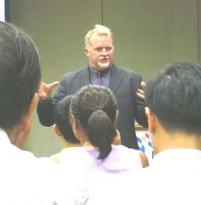Biomed academic lectures in Singapore's new national library
Published on 07 February, 2006
Associate Professor Graham Pegg, Head of CQU’s School of Chemical & Biomedical Sciences, was invited to give a public lecture at the impressive new National Library building in Singapore, as part of the library’s current focus on showcasing life sciences.
The talk was arranged by CQU’s education partner in Singapore, Hartford Education Group, and coincided with a scheduled visit by Dr Pegg to Singapore in late January 2006 for classes, moderation of assignment marks and meetings with Hartford personnel and students for the Biomedical Science program.
 “CQU-Hartford have been running a very successful ‘top-up’ biomedical degree study model since 2003, where Diploma graduates from Singapore’s Polytechnic system are able to upgrade their qualification to degree status by 2 years of part-time study in their own country,” he said.
“CQU-Hartford have been running a very successful ‘top-up’ biomedical degree study model since 2003, where Diploma graduates from Singapore’s Polytechnic system are able to upgrade their qualification to degree status by 2 years of part-time study in their own country,” he said.
The seminar given by Associate Professor Pegg at the National Library in Singapore was entitled : ‘ Pharmacogenomics – the near future of personalised medicine?’.
Dr Pegg says that “pharmacogenomics is the intersection of DNA genomics with medicine, with the idea being that in the relatively near future, a genetic test might assist doctors to choose the right prescription and the correct dose for each individual patient".
While severe adverse drug reactions (ADRs) are relatively rare, it is estimated that in the USA alone there are more than 100,000 deaths each year from patients adversely reacting to prescribed medications.
Professor Pegg said the basis for these adverse events is that each person absorbs and metabolises drug molecules differently, and these processes within an individual are governed by differences in enzymes and transporters, which are in turn are imprinted in our DNA.
“A dose of a drug easily tolerated by one person who is a rapid metaboliser haplotype, could be toxic and even life threatening to a person who metabolises exogenous compounds more slowly,” he said.
Besides assisting doctors in the future to avoid the possibility of adverse reactions in patients with different classes of drugs, the future promise of pharmacogenomics is a specific genetic test for a disease and delivery of a specific medication for that disease.
 “There have been a couple of recent success stories in the cancer field for pharmacogenomics, and most pharmaceutical industry commentators believe that oncology is the most likely field where the combination of gene testing and specific pharmaceutical intervention strategy will develop most rapidly.”.
“There have been a couple of recent success stories in the cancer field for pharmacogenomics, and most pharmaceutical industry commentators believe that oncology is the most likely field where the combination of gene testing and specific pharmaceutical intervention strategy will develop most rapidly.”.
Dr Pegg said “that while the global pharmaceutical industry recognises that personalised medicine is the way of the future, understanding how to recognise multiple genetic and environmental indicators for complex variable diseases such as coronary heart disease, diabetes, and atherosclerosis is an incredibly difficult task".
“Each human being has more than 1 million single base differences in their DNA (called single nucleotide polmorphisms or SNPs) and much effort is being put in to see if patterns emerge so that people who have a certain combination of SNPs might be prone to mental illness for example.”.

